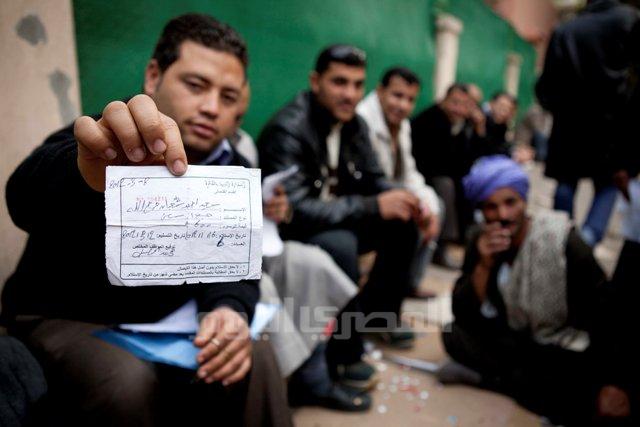
Hundreds of Egyptians have been gathering around the Libyan Embassy in Cairo over the past week, waiting to receive or apply for visas as confusion grows regarding the status of migrant Egyptians in Libya.
“I’ve been sleeping out here for four days waiting for someone in the embassy to open a window and take my visa application,” said Refaat Ismail. After working as a construction worker for over 10 years in Tubrok, Ismail now finds himself faced with a whole new set of rules, making his re-entry into Libya all the more difficult.
Since 2 February, the Libyan Embassy has been swarmed by two groups of people — one waiting to receive their passports and visas and the other waiting to apply. Many of those waiting to apply have already filled out the pre-requisite paperwork and come from their local governorates to apply for a visa.
“I already spent LE3,000 to pay for a work permit, finished my medical papers, and paid for transportation all the way up here. I can’t go back without handing in these papers,” said 49-year-old Bakheet Fayez, a flooring worker from Assiut.
Fayez claims he has spent 10 days in front of the embassy waiting to turn in his papers, spending nights at relatives’ homes. “I can’t leave because these papers have expiration dates, and I can’t afford to go through the process of getting them again.”
Fayez spent seven years in Tripoli. He left when revolutionaries entered the city in August.
The International Organization for Migration estimates that around 200,000 Egyptian migrants fled Libya during the turmoil. The IOM estimates around 1.5 million Egyptians lived in Egypt before their revolution. Many of these people supported families back home, bringing in around US$33 million a year in remittances.
Those who have already applied for visas face another obstacle: receiving their passports.
One employee in the Libyan Embassy yelled over a fence at a sea of people that 10,000 passports are waiting to be signed inside, and that there was a mix-up in distribution.
“This is the fifth day since I was supposed to receive my passport, and I’ve spent every day since here waiting,” said Tarek Asaad, a 22-year-old painter from Beheira Governorate.
Asaad had a representative of his Libyan sponsor hand in his papers for him, an option that many have found to be much easier, if more costly.
Still, each passing day leaves him more uneasy. “I’m afraid I’ll receive an expired visa, because it was sitting there stamped for over three weeks,” said Asaad, who applied for his visa in mid-January.
Although Libya is currently undergoing its own political turmoil, many of these migrant workers are craftsmen who believe Egypt’s western neighbor still holds more professional opportunities.
“There is still work in Libya for us; more than here. At least in Libya I know that at the very least someone like me will make LE2,500 in a month. In Egypt I’d be lucky to make LE1,000,” said Sayed Ali, a construction worker who worked in Misrata for four years.
Many of these workers would go back and forth between Egypt and Libya depending on the availability of jobs, which according to the IOM is seasonal in many cases. They are no strangers to the journey or the administrative demands.
For these would-be migrants, though, applying for visas to enter Libya — in place since 1 January, 2012 — is an entirely new prospect. Egypt and Libya are still technically bound to the Four Freedoms Agreement, which states that Egyptians and Libyans are free to move across the Libya-Egypt border without visas. However, this is not the first time the sides have infringed upon this agreement to limit the flow of Egyptian migrants to Libya. In 2004, the former minister of manpower signed the first agreement requiring work permits as a pre-requisite for crossing between the two countries.
In fact, the embassy may not be accepting applications for some time; due to new visa requirements starting from Sunday, 12 February, it issued a statement on Sunday stating that the Libyan government will put off receiving passports until further notice. The new visas are to be stamped by the Libyan National Transitional Council and the Libyan Embassy in Egypt.
Tensions flared on numerous occasions over the past few days with some of the angry visa applicants occasionally blocking roads, either on purpose or by accident due to their large numbers.
But amid the chaos, visas have been issued and work is slowly moving ahead.
“I don’t blame the embassy. They just went through a revolution, just like us, of course they will have administrative difficulties,” said Kamel Adham, a brick maker from Fayoum.
Adham applied for his visa on 18 January and was told he would receive it on 2 February. By 13 February, he was still waiting.
“I actually went inside the embassy during all of this mess. The embassy workers are few and can’t handle all the pressure. They are also waiting for decisions from their foreign ministry all the time,” Adham said.
Egypt Independent was unable to reach the staff of the Libyan Embassy.
Since there is no official protocol requiring Egyptians in Libya to acquire long-term visas, they are being issued 30-day visas to cross the border.
Mohsen Darwish had just received his visa after a five-day wait for his name to be called. The type of visa was unspecified. On it, “The Socialist People’s Libyan Arab Republic” was crossed out with a blue pen. Next to it was written “The Free Libya.”




